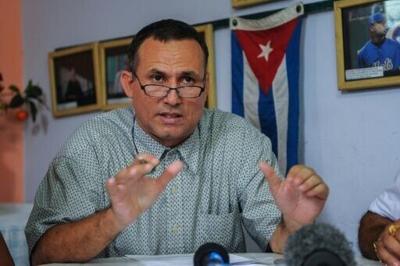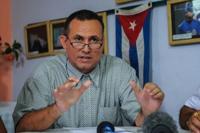Jailed Cuban dissident Jose Daniel Ferrer, the longtime leader of the island's pro-democracy movement, announced Friday that he had chosen to go into exile after suffering "torture" and "humiliation" in prison.
"Faced with the constant pressure from the political police to leave Cuba, I have ended up accepting exile," the 55-year-old wrote in a letter from prison dated September 10, which his wife Nelva Ismaray Ortega read to AFP by phone.
The letter didn't say where he expected to go or when but it praised US policy on Cuba.
Ferrer said that since he was returned to prison in April after being briefly freed under a deal with former US president Joe Biden, "the cruelty of the dictatorship towards me has known no bounds."
In the letter, he cited "blows, torture, humiliation, threats and extreme conditions" in prison, including "the theft of food and hygiene products ordered by the regime's minions."
He said he took the decision to leave faced with threats that his wife would also be imprisoned and his young son sent to an institution for juvenile offenders.
- Leaving 'not for long' -
"I leave Cuba with my dignity and honor intact, and not for long," he declared, setting a deadline of October 6 for his release under the exile pact to which he agreed with the authorities.
His departure, expected in a matter of days, deals a blow to opposition on the communist-run island, which is in the throes of its worst economic crisis in decades and a mass exodus of its youth, mostly to the United States.
Ferrer, founder of the Patriotic Union of Cuba (UNPACU), one of the most active opposition organizations in the one-party state, had for years resisted pressure to go into exile to avoid prison.
"Jose Daniel has been an important opposition figure...who sacrificed a lot for Cuba's freedom," fellow dissident Martha Beatriz Roque said, adding it was "time he had a life of his own."
Ferrer was the most high-profile of the political prisoners released in January as part of a landmark deal struck with Biden in return for Washington removing Cuba from a list of terrorism sponsors.
But he was sent back to prison after current President Donald Trump slapped Cuba back on the list shortly after returning to office.
Ferrer has been in and out of prison since March 2003, when he and 74 other opposition members were arrested in a three-day period of repression known as Cuba's "Black Spring."
He was released in 2011 but sent back to prison in 2021 following a crackdown on rare anti-government street protests that rattled the communist authorities.
The repression the followed the protests silenced many critical voices and left the opposition in disarray.
Ferrer, in his letter, said he had lost faith in many of his struggle comrades, because of their "disunity, dogmatic nature and lack of effectiveness" while noting that "good fighters" remain.
During his brief spell of freedom earlier this year he had defied the authorities by criticizing Cuba's leadership on social media soup kitchen at his home funded by exiled Cubans.
He also met with the head of the US diplomatic mission in Cuba, Mike Hammer, at his home in the eastern city of Santiago de Cuba.
In his letter, he said "only the United States...truly stands in solidarity with the peaceful opposition and the Cuban people" -- an implicit rebuke of the EU, which has angered dissidents by maintaining a political and cooperation agreement with Cuba.
lp/cb/iv




